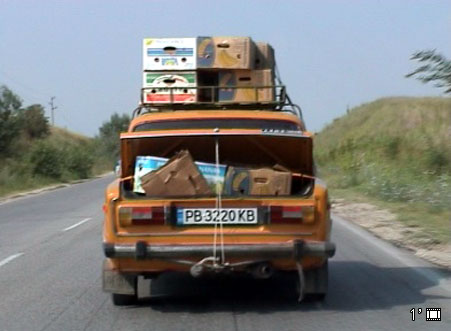The windows are smashed, the rooms empty of furniture. The kitchens on the ground floor next to the dining hall have been stripped of all fittings, wires have been ripped out of the walls, presumably for their copper. On the upper floors the identical smallish rooms flanking a central corridor lost their doors allowing the shared secrets, whispered fears and adolescent conspiracies to dissipate in the wind that blows in off the surrounding fields. The walls have some graffiti on them but there is no passion in it, desultory proclamations of love, what looks like the half-hearted curses of crossed-out names. Creative imagination has flown off with the final occupants. M says that there are many such buildings in Bulgaria and that some of them were rented out to dubious clothing businesses which produced for a year or two before disappearing, many leaving behind unpaid (mainly women) workers and tax debts. L mentions that in the mid to late nineties companies that produced for Austrian and British chains were a focus of the Clean Clothes Campaign, an alliance of trade unions and NGOs dedicated to the improvement of wages and conditions in the clothing trade. Relatively recently (2005) there was an exhibition in Sofia and Haskovo relating to the fact that the women who sew jeans get about 2 Leva (€1) per pair.
The school next door but one is obviously still functional though disquietingly silent, as all schools are in the summer holidays. At the beginning of the second half of the 19th century the town actually inaugurated one of the first girl’s schools in Bulgaria. Along with other small towns in the region, Bratzigovo was also the site of a massacre by the Turks of the leaders of the premature and failed April Uprising of 1876 which anticipated independence two years later.
Driving back to Plovdiv makes something clear – that historical ethnic divisions were partially influenced by physical geography. |
|

The valleys, such as that of the River Maritsa, were fertile and easily travelled. This meant that Ottoman influence was strongest here while Bulgarian culture was preserved by the villages and monasteries situated in the mountains. After the Ottoman withdrawal the situation was partially reversed in the sense that the Turkish-speaking minority is mainly found in the southern part of the country, especially in the Rhodope Mountains. |